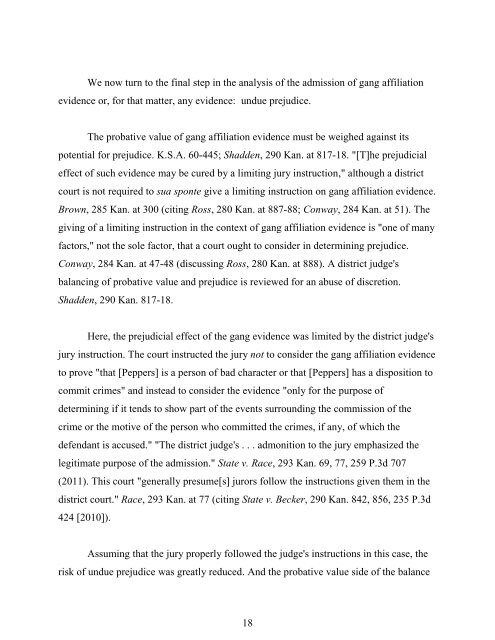Kansas Supreme Court - 101551 â State v. Peppers
Kansas Supreme Court - 101551 â State v. Peppers
Kansas Supreme Court - 101551 â State v. Peppers
Create successful ePaper yourself
Turn your PDF publications into a flip-book with our unique Google optimized e-Paper software.
We now turn to the final step in the analysis of the admission of gang affiliation<br />
evidence or, for that matter, any evidence: undue prejudice.<br />
The probative value of gang affiliation evidence must be weighed against its<br />
potential for prejudice. K.S.A. 60-445; Shadden, 290 Kan. at 817-18. "[T]he prejudicial<br />
effect of such evidence may be cured by a limiting jury instruction," although a district<br />
court is not required to sua sponte give a limiting instruction on gang affiliation evidence.<br />
Brown, 285 Kan. at 300 (citing Ross, 280 Kan. at 887-88; Conway, 284 Kan. at 51). The<br />
giving of a limiting instruction in the context of gang affiliation evidence is "one of many<br />
factors," not the sole factor, that a court ought to consider in determining prejudice.<br />
Conway, 284 Kan. at 47-48 (discussing Ross, 280 Kan. at 888). A district judge's<br />
balancing of probative value and prejudice is reviewed for an abuse of discretion.<br />
Shadden, 290 Kan. 817-18.<br />
Here, the prejudicial effect of the gang evidence was limited by the district judge's<br />
jury instruction. The court instructed the jury not to consider the gang affiliation evidence<br />
to prove "that [<strong>Peppers</strong>] is a person of bad character or that [<strong>Peppers</strong>] has a disposition to<br />
commit crimes" and instead to consider the evidence "only for the purpose of<br />
determining if it tends to show part of the events surrounding the commission of the<br />
crime or the motive of the person who committed the crimes, if any, of which the<br />
defendant is accused." "The district judge's . . . admonition to the jury emphasized the<br />
legitimate purpose of the admission." <strong>State</strong> v. Race, 293 Kan. 69, 77, 259 P.3d 707<br />
(2011). This court "generally presume[s] jurors follow the instructions given them in the<br />
district court." Race, 293 Kan. at 77 (citing <strong>State</strong> v. Becker, 290 Kan. 842, 856, 235 P.3d<br />
424 [2010]).<br />
Assuming that the jury properly followed the judge's instructions in this case, the<br />
risk of undue prejudice was greatly reduced. And the probative value side of the balance<br />
18
















